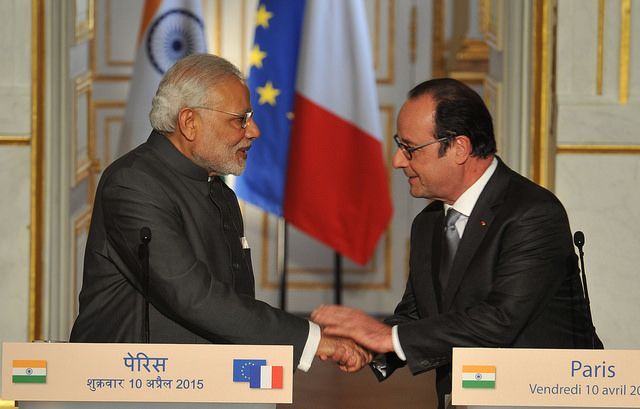'Having himself tweaked the Rafale deal Modi may find that he may knock defence agents out of the fine print of a deal, but they lurk not only in chateaus around Paris, but in the ante rooms of ministers -- French and Indian -- or even the homes of Indian ambassadors,' says Ambassador K C Singh.

Prime Minister Narendra Modi's visit to France was closely watched to monitor two stalled deals, both critical to national security.
The civil nuclear energy agreement with Areva related to energy security; the MMRCA (Medium Multiple Role Combat Aircraft) deal with Dassault impinged on national defence.
The second was tackled in a typical Modi way -- inventive, sudden and non-transparent.
Defence Minister Manohar Parrikar, while applauding the outcome, conceded to a national daily that the 'fine print of what has been agreed is not with me yet.'
Essentially, the aircraft deal with French supplier Dassault dates from 2012, with an agreement to purchase 18 planes in flyaway condition, the rest of the 126 to be made in collaboration with HAL (Hindustan Aeronautics Ltd) in what fits into PM Modi's 'Make in India' slogan.
The new deal, elements of which have been leaked piecemeal over the last few days, involves the purchase of 36 aircraft in flyaway condition. The rest, after initial silence, it seems, may now be made by Dassault in collaboration with a private sector Indian company. There were reports of RIL already having an agreement with the manufacturers.
The latter suggestion surfacing in the media is to overcome mounting criticism that 36 aircraft would constitute a mere two squadrons and really made no sense as the Indian Air Force is already saddled with multiple platforms making it a logistics and maintenance nightmare.
Also in defence of the PM's move 'national security' was quoted, explaining that a fresh RFP (Request For Proposal) would have meant inordinate delay in meeting the IAF's needs.
There was also new found favour for G2G (Government-to-Government) purchases. All these issues need closer examination.
While it may be true that India has got a better price for the initial 36 aircraft, but that was inevitable for planes made in France compared to a new and Indian manufacturing line.
France used the leverage they got with Egypt having already placed an order for Rafales, giving new life to the Dassault manufacturing line. However, with the IAF stuck with the initial supply and the price or timelines for the planes to be subsequently manufactured in India still unknown, the benefit in any negotiation will tilt in favour of the Indian private sector-Dassault combine.
The French have shrewdly left an Indian oligarch to manage the Indian political and bureaucratic system. Lack of clarity on such issues is likely to bedevil the supplementary Rafale acquisition.
Much is being made of the G2G route to bypass the time consuming RFP tendering process. It is true that then defence minister A K Antony, temperamentally cautious and mindful of the Bofors scandal, gravitated towards G2G deals.
These worked best with the US, via the foreign military sales route, as there is much closer oversight of deals in that country, making bribing difficult. However, the pricing has a catch as private manufacturers quote the highest they previously sold similar equipment to a foreign buyer, irrespective of how small the order was.
This tends to ramp up the cost of equipment. Similar oversight may be unavailable in France where even presidents have had corruption allegations levelled against them.
Thus, G2G as a new mantra for clean and efficient defence deal-making may be illusory. Having himself tweaked the Rafale deal PM Modi may find subsequently that he may knock defence agents out of the fine print of a deal, but they lurk not only in chateaus around Paris, but in the ante rooms of ministers -- French and Indian -- or even the homes of Indian ambassadors.
It is possible that PM Modi has used the Rafale deal to pry open access to other technologies that India desperately needs in defence and space. Naturally that would not find mention anywhere in writing.
The French themselves gained access to advanced nuclear weapons technology once US President Richard Nixon took over, as he remembered that during his public exile, after his electoral loss to John F Kennedy in 1960, he was treated with personal attention by then French president Charles de Gaulle.
The spillover effects may thus go to the civil nuclear deal or beyond.
When PM Modi returns to India, hopefully he will share the 'fine print' with his defence minister, as they would need to take a call on where the Rafales fit into the future composition of the Indian Air Force.
On one side lingers the indigenous Tejas that has had time and equipment delays. On the other is the fifth generation fighter being developed by the Russians, still at the prototype stage.
Russian convergence of interests with China and the likelihood of the sale of advanced aircraft to them raises questions about their suitability as partners in developing cutting edge technology. There is also the issue of Russia treating India more as a financier than as a partner.
The real advantage of a defence deal with France is that they do not mix business with some global peace-making evangelism, within and outside the UN Security Council.
Purchases from the US always have the danger of the US Congress or a US president withholding spare parts in the middle of a combat situation. Similarly, the Eurofighter -- being a joint production of more than one country -- issues of spares etc could arise.
Russia is recalibrating its posture to meet new challenges and has technology gaps.
Thus, by simple strategic and deductive reasoning, the two nations that will be more reliable defence cooperation partners are Israel and France. Nevertheless, India's relationship with the US is critical for stability in Asia in the face of a rising China.
Progressively, based on rising mutual confidence, Indian defence forces will induct more and more of US equipment. The Rafale deal is thus a partial move in the much needed modernisation of Indian defence forces to meet the challenges of the current century.
The nation would like to know how the Rafale part order fits into the larger picture.
ALSO READ
Image: Prime Minister Narendra Modi and French President Francois Hollande in Paris.











 © 2025
© 2025